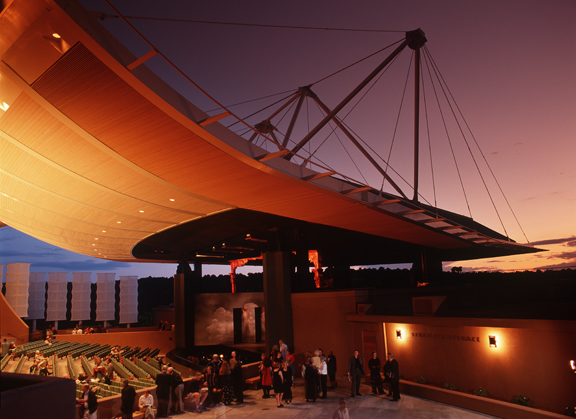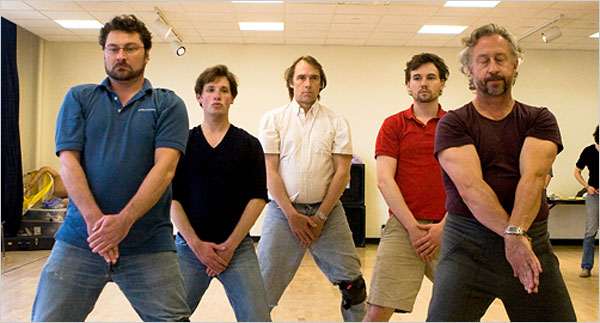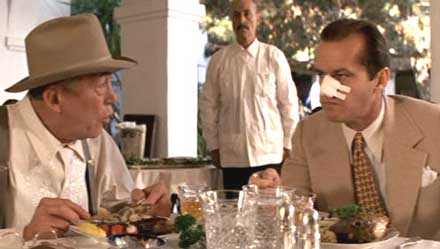I arrived in Santa Fe early yesterday evening, dropped my bags at the rented condo where I’ll be spending the next three weeks, called Mrs. T and my mother to let them know that I was in one piece, then went off to dinner with Paul Moravec, composer of The Letter, which opens in twelve days.
My trip began with a short working holiday: I flew to Los Angeles and spent two nights in the improbably beautiful Topanga Canyon. I saw a pair of plays at the Will Geer Theatricum Botanicum and stayed at the Tuscali Mountain Inn, an idyllic hillside retreat located a mere quarter-mile from the theater. The hosts are friendly, the food tasty, the furnishings elegant (a Picasso etching was hung next to my desk), the beds comfortable. The last of these was more important than usual: I was greatly in need of sleep, and got plenty of it.
 As for Paul, he made it to Santa Fe a week ago and has been reporting to me by phone twice daily about the rehearsals. I grew more excited each time I spoke to him. Now the wait is over. I’m here. It’s happening. Later this morning I’ll drive to the Santa Fe Opera to attend my first rehearsal. Paul has already told me what to expect: “It’s overwhelming, hearing it being performed for real. You’ll feel the same way when you get here. You’ll want to cry.” I’m sure he’s right—I’ve always been an easy weeper—but once the shock wave has rolled over me, I have no doubt that the press of work will pull me to my feet again. I doubt I’m going to have much time to feel overwhelmed by the unfamiliar sensation of seeing and hearing my words and Paul’s music sung by performers on a stage.
As for Paul, he made it to Santa Fe a week ago and has been reporting to me by phone twice daily about the rehearsals. I grew more excited each time I spoke to him. Now the wait is over. I’m here. It’s happening. Later this morning I’ll drive to the Santa Fe Opera to attend my first rehearsal. Paul has already told me what to expect: “It’s overwhelming, hearing it being performed for real. You’ll feel the same way when you get here. You’ll want to cry.” I’m sure he’s right—I’ve always been an easy weeper—but once the shock wave has rolled over me, I have no doubt that the press of work will pull me to my feet again. I doubt I’m going to have much time to feel overwhelmed by the unfamiliar sensation of seeing and hearing my words and Paul’s music sung by performers on a stage.
A year and a half ago, Paul and I attended the third New York screening of the film version of Sweeney Todd, a work that influenced us deeply in writing The Letter. As I wrote in this space at the time:
Halfway throught he film, in the brief pause between “Epiphany” and “A Little Priest,” I leaned over to Paul and whispered, “This is the mark we have to hit.” He nodded.
On the street afterward, I said, “Inspiring, huh?”
Paul grinned. “The work waits…and I’m full of joy,” he replied. Then he disappeared into the night.
That goes octuple today.


 The trouble with “Pericles” is that it lacks the inexorable momentum of Shakespeare’s best-loved plays, which hurtle toward their denouements like bullets toward the bull’s-eye. Not so this sprawling tale of a Phoenician prince who wanders from adventure to adventure, driven by the lash of increasingly implausible coincidence and the skullduggery of the 60-odd characters who share the stage with him. Yes, there’s a plot, but it’s so loosely knit that Shakespeare launches each act with a prologue whose sole purpose is to keep the audience in the picture. By the time Pericles is finally reunited with his long-lost wife and daughter, you’ll probably have forgotten how they disappeared in the first place.
The trouble with “Pericles” is that it lacks the inexorable momentum of Shakespeare’s best-loved plays, which hurtle toward their denouements like bullets toward the bull’s-eye. Not so this sprawling tale of a Phoenician prince who wanders from adventure to adventure, driven by the lash of increasingly implausible coincidence and the skullduggery of the 60-odd characters who share the stage with him. Yes, there’s a plot, but it’s so loosely knit that Shakespeare launches each act with a prologue whose sole purpose is to keep the audience in the picture. By the time Pericles is finally reunited with his long-lost wife and daughter, you’ll probably have forgotten how they disappeared in the first place. June 20 marked the thirty-fifth anniversary of the original theatrical release of
June 20 marked the thirty-fifth anniversary of the original theatrical release of